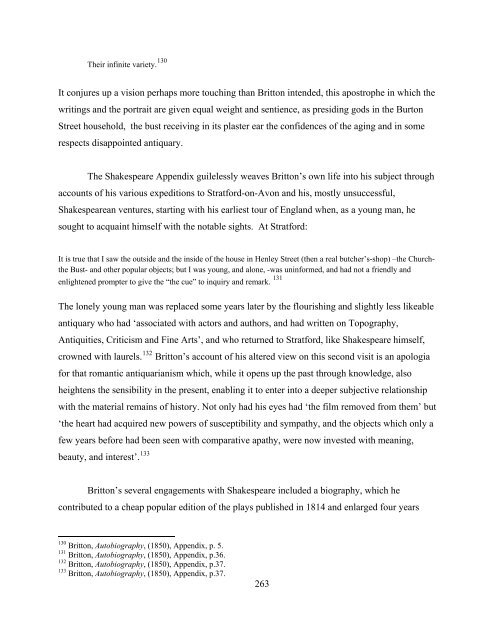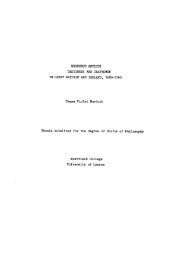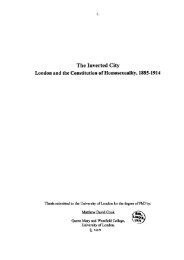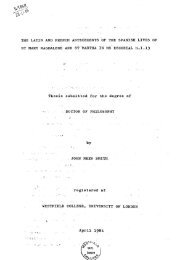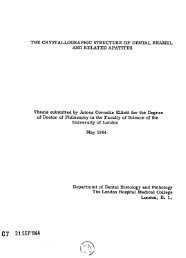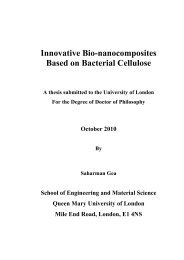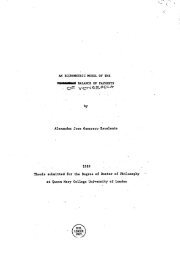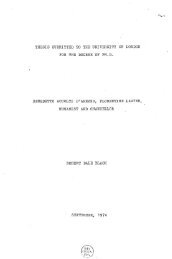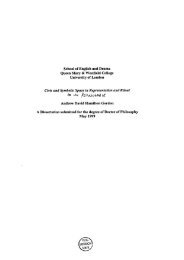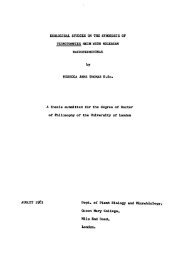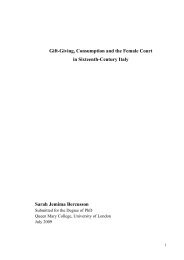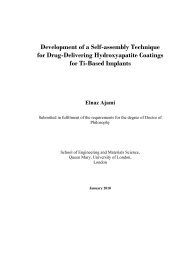Antiquaries in the Age of Romanticism: 1789-1851 - Queen Mary ...
Antiquaries in the Age of Romanticism: 1789-1851 - Queen Mary ...
Antiquaries in the Age of Romanticism: 1789-1851 - Queen Mary ...
You also want an ePaper? Increase the reach of your titles
YUMPU automatically turns print PDFs into web optimized ePapers that Google loves.
Their <strong>in</strong>f<strong>in</strong>ite variety. 130<br />
It conjures up a vision perhaps more touch<strong>in</strong>g than Britton <strong>in</strong>tended, this apostrophe <strong>in</strong> which <strong>the</strong><br />
writ<strong>in</strong>gs and <strong>the</strong> portrait are given equal weight and sentience, as presid<strong>in</strong>g gods <strong>in</strong> <strong>the</strong> Burton<br />
Street household, <strong>the</strong> bust receiv<strong>in</strong>g <strong>in</strong> its plaster ear <strong>the</strong> confidences <strong>of</strong> <strong>the</strong> ag<strong>in</strong>g and <strong>in</strong> some<br />
respects disappo<strong>in</strong>ted antiquary.<br />
The Shakespeare Appendix guilelessly weaves Britton’s own life <strong>in</strong>to his subject through<br />
accounts <strong>of</strong> his various expeditions to Stratford-on-Avon and his, mostly unsuccessful,<br />
Shakespearean ventures, start<strong>in</strong>g with his earliest tour <strong>of</strong> England when, as a young man, he<br />
sought to acqua<strong>in</strong>t himself with <strong>the</strong> notable sights. At Stratford:<br />
It is true that I saw <strong>the</strong> outside and <strong>the</strong> <strong>in</strong>side <strong>of</strong> <strong>the</strong> house <strong>in</strong> Henley Street (<strong>the</strong>n a real butcher’s-shop) –<strong>the</strong> Church-<br />
<strong>the</strong> Bust- and o<strong>the</strong>r popular objects; but I was young, and alone, -was un<strong>in</strong>formed, and had not a friendly and<br />
enlightened prompter to give <strong>the</strong> “<strong>the</strong> cue” to <strong>in</strong>quiry and remark. 131<br />
The lonely young man was replaced some years later by <strong>the</strong> flourish<strong>in</strong>g and slightly less likeable<br />
antiquary who had ‘associated with actors and authors, and had written on Topography,<br />
Antiquities, Criticism and F<strong>in</strong>e Arts’, and who returned to Stratford, like Shakespeare himself,<br />
crowned with laurels. 132 Britton’s account <strong>of</strong> his altered view on this second visit is an apologia<br />
for that romantic antiquarianism which, while it opens up <strong>the</strong> past through knowledge, also<br />
heightens <strong>the</strong> sensibility <strong>in</strong> <strong>the</strong> present, enabl<strong>in</strong>g it to enter <strong>in</strong>to a deeper subjective relationship<br />
with <strong>the</strong> material rema<strong>in</strong>s <strong>of</strong> history. Not only had his eyes had ‘<strong>the</strong> film removed from <strong>the</strong>m’ but<br />
‘<strong>the</strong> heart had acquired new powers <strong>of</strong> susceptibility and sympathy, and <strong>the</strong> objects which only a<br />
few years before had been seen with comparative apathy, were now <strong>in</strong>vested with mean<strong>in</strong>g,<br />
beauty, and <strong>in</strong>terest’. 133<br />
Britton’s several engagements with Shakespeare <strong>in</strong>cluded a biography, which he<br />
contributed to a cheap popular edition <strong>of</strong> <strong>the</strong> plays published <strong>in</strong> 1814 and enlarged four years<br />
130 Britton, Autobiography, (1850), Appendix, p. 5.<br />
131 Britton, Autobiography, (1850), Appendix, p.36.<br />
132 Britton, Autobiography, (1850), Appendix, p.37.<br />
133 Britton, Autobiography, (1850), Appendix, p.37.<br />
263


